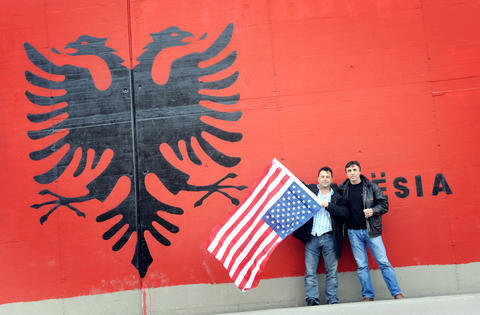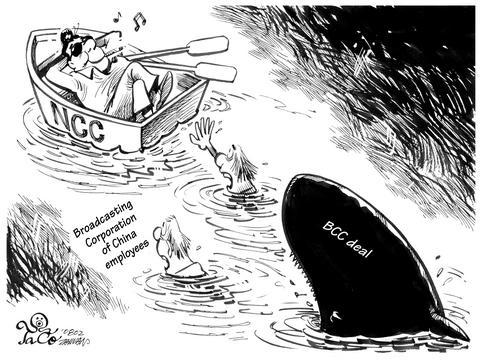¡@
Kosovo to
declare independence today: PM
AGENCIES, PRISTINA AND BRUSSELS
Sunday, Feb 17, 2008, Page 1
¡@
 |
| Kosovo
Albanian men pose holding an upside-down US flag next to a giant
Albanian flag painted on the edge of a road to Pristina on Friday.
|
¡@
Kosovo Prime Minister Hashim Thaci confirmed yesterday that
the province would declare its independence from Serbia today, the day when the
"will of the citizens of Kosovo" would be implemented.
"Tomorrow will be a day of calm, of understanding, and of state engagements for
the implementation of the will of the citizens of Kosovo," said Thaci, after
meeting religious leaders from the predominantly ethnic Albanian province.
Expectations that independence would be declared today have been running high,
but Thaci's comments marked the first top-level confirmation that the long
awaited break with Serbia would take place this weekend.
Thaci appealed for celebrations to unfold with "dignity ... on the day of the
declaration of independence, on the big day, on the historic day ... a day of
thanksgiving for a sovereign and independent Kosovo."
Kosovo inched closer to its historic declaration of independence with a growing
sense of excitement among its people and the EU launching a police and judicial
mission to smooth the birth of the world's newest state.
Serbia, backed by Russia, has said that the split -- supported by the US and
most major European powers, nine years after Kosovo was put under interim UN
administration -- would be illegal.
The leader of Kosovo's Serb minority, Milan Ivanovic, said that the EU police
and justice mission -- designed to help Kosovo's transition to sovereignty --
was a form of "occupation."
Without giving their sources, several newspapers in Pristina reported yesterday
that the declaration would come around 3pm today to the strains of Ode to Joy,
the EU anthem.
Street parties and fireworks would follow, while the NATO-lead Kosovo Force that
has been deployed in Kosovo since 1999 -- when the province was put under UN
interim administration -- is expected to be out in force to ensure security.
"Everything is pointing to Sunday," a source close to Thaci's government said
earlier in the day, as Serbia all but gave up hope of hanging onto the province
it sees as the cradle of its culture and Serbian Orthodox religion.
The EU yesterday approved the launch of a 2,000-strong police and justice
mission for Kosovo.
The supervisory mission was formally endorsed at midnight after none of the EU's
27 member states objected to an operation plan for the mission before an agreed
deadline, a diplomatic source said.
"The [EU] Council has decided to launch the European Union rule of law mission
in Kosovo," the EU said in a statement, adding that the operation would take
over powers from the existing UN mission in the territory after a 120-day
transition period.
The statement also named Dutchman Pieter Feith as the EU civilian administrator
in Kosovo. He is expected to take over from UN supremo Joachim Ruecker in June.
The EU rule of law mission will chiefly mentor and advise Kosovo police and
judicial authorities but will have some executive powers, notably in the fight
against organized crime, corruption and the hunt for war criminals.
EU foreign ministers will discuss their response to Kosovo's decision tomorrow.
Diplomats said up to 20 EU countries were likely to recognize the new state
rapidly, but at least six -- Cyprus, Greece, Slovakia, Spain, Bulgaria and
Romania -- have indicated they will not do so immediately.
¡@
¡@

¡@
¡@
Taiwanese and
proud
Sunday, Feb 17, 2008, Page 8
After reading about the recent legislative elections and the upcoming
presidential election, I'm intrigued by how voters in Taiwan grapple with the
issue of national identity.
Having immigrated to the US at age six, I crossed cultural borders constantly
during my childhood. Each morning, I would leave a house filled with Asian
customs and traditions and then go to school surrounded by American culture.
When the "where are you from" question was asked from time to time, I usually
replied "China," which was geographically accurate, as my family left Shanghai
for the US.
However the "Chinese-American" label wasn't so accurate.
My father grew up in Taiwan, my mother grew up in Japan and my brother was born
in Japan.
All four of my grandparents grew up in Taiwan speaking Taiwanese as their
primary language.
Nevertheless, I described myself as Chinese-American to others throughout my
childhood in spite of the obvious fact that I didn't have Chinese heritage.
Years later, while in graduate school, one of my roommates, a Taiwanese, was
having a lively discussion with one of his close friends, a speaker of
Cantonese.
The Cantonese friend thought of himself as Chinese and considered Taiwan as part
of a greater China.
My roommate disagreed -- for obvious reasons -- and then turned to me to ask:
"What do you consider yourself?"
I tersely replied "Chinese" while grabbing a quick bite during a study break.
Aware of my family's background, my roommate became exasperated and gave me a
look.
Not being politically savvy, I simply finished my snack and went back to hitting
the books.
A few years later, I heard the distinct sound of Taiwanese as my father was
chatting on the phone. I assumed that he was talking to someone on his side of
the family.
However, my mother said that he was on the phone with one of my cousins on her
side of the family.
Unlike most of my cousins on her side, that particular cousin grew up in Taiwan.
They were discussing the upcoming 2000 presidential election, when it seemed the
Democratic Progressive Party (DPP) could replace the Chinese Nationalist Party (KMT).
A few months later, that cousin visited us for the Thanksgiving holiday and
cheerfully discussed with my father the first Taiwanese party to capture the
presidency.
They spoke of that election with the same emotion felt when describing a
profoundly meaningful personal event, such as one's wedding day or the birth of
one's child.
I was disappointed in myself that I had not understood before how much
significance this event held for my father.
The clues were there. He was born in Taiwan under Japanese colonial rule,
witnessed second-class treatment at the hands of the KMT during his childhood
and ultimately had to leave his native Taiwan for a chance at a better life as
an adult.
Add on the fact that none of my grandparents lived to see a Taiwanese elected to
preside over their own country and it's clear why that election was so
significant.
While one election certainly didn't undo decades of injustice, at least it gave
hope to my father that the ship continued to point in the right direction.
As for my journey to the obvious, I'm not exactly sure what took so long.
Perhaps I was so focused on school that I didn't reflect fully on my origins.
Perhaps it was fear that kept my parents from discussing sensitive political
topics. Perhaps it was the hassle of having to explain the distinction between
Chinese and Taiwanese to everyone.
Circling back to the issue of the upcoming presidential election, as Taiwanese
voters proceed to the polls again, they need to carefully consider their own
history in order to build that path to a better future.
I suspect that many are realizing now that they themselves have essentially
handed the legislature to a foreign regime.
If the Taiwanese truly understand who they are, then they should be extremely
wary of the KMT, who are likely to appease communist China, export strategic
technology to China and shackle Taiwan to a Chinese economy that may well be a
bubble on the verge of collapse.
The Taiwanese should make a stand now so that the ship continues to point in the
direction of freedom.
Otherwise, they will hand their destiny over to the same people who forced
suffering upon them for decades.
As a person of Taiwanese heritage with a US viewpoint, it is obvious that Taiwan
must acknowledge its soul or risk losing that and much more in the future.
Carl Chiang
Richmond, California
¡@